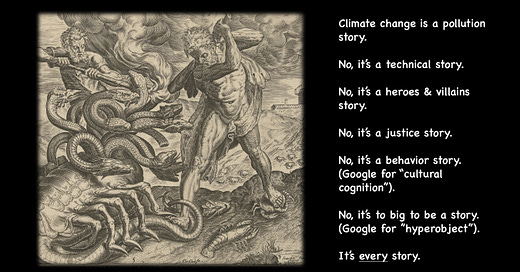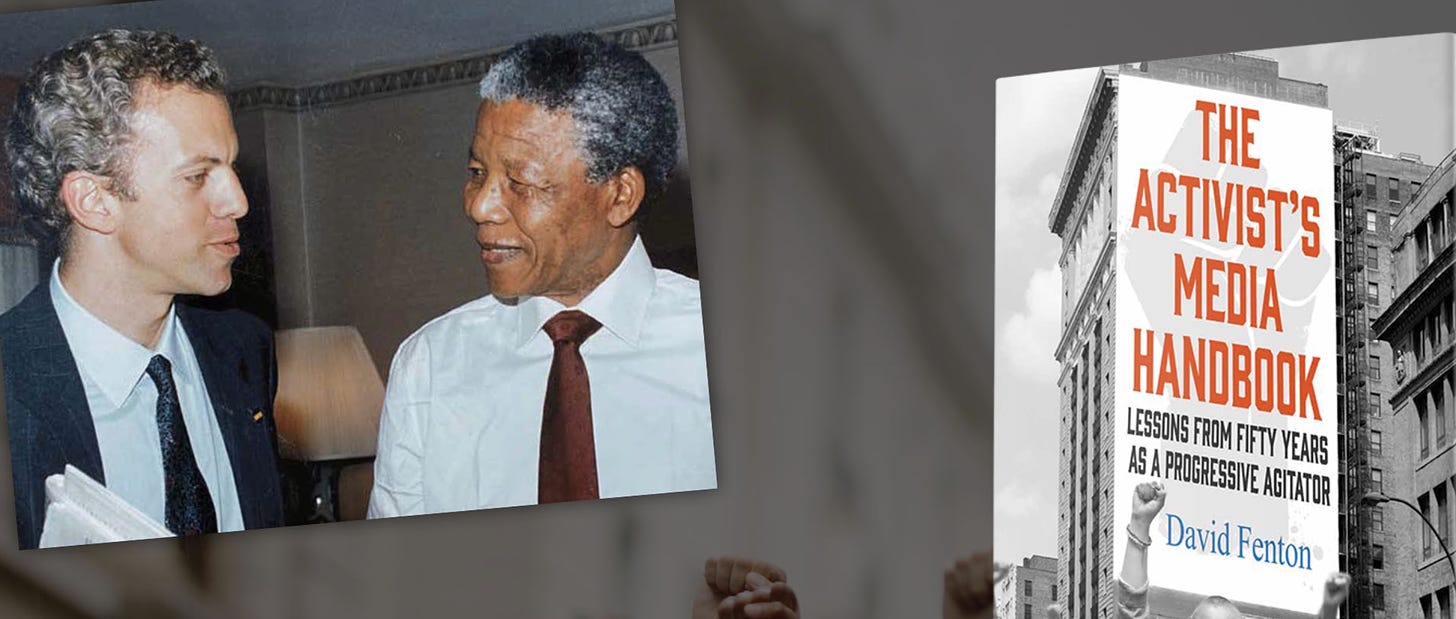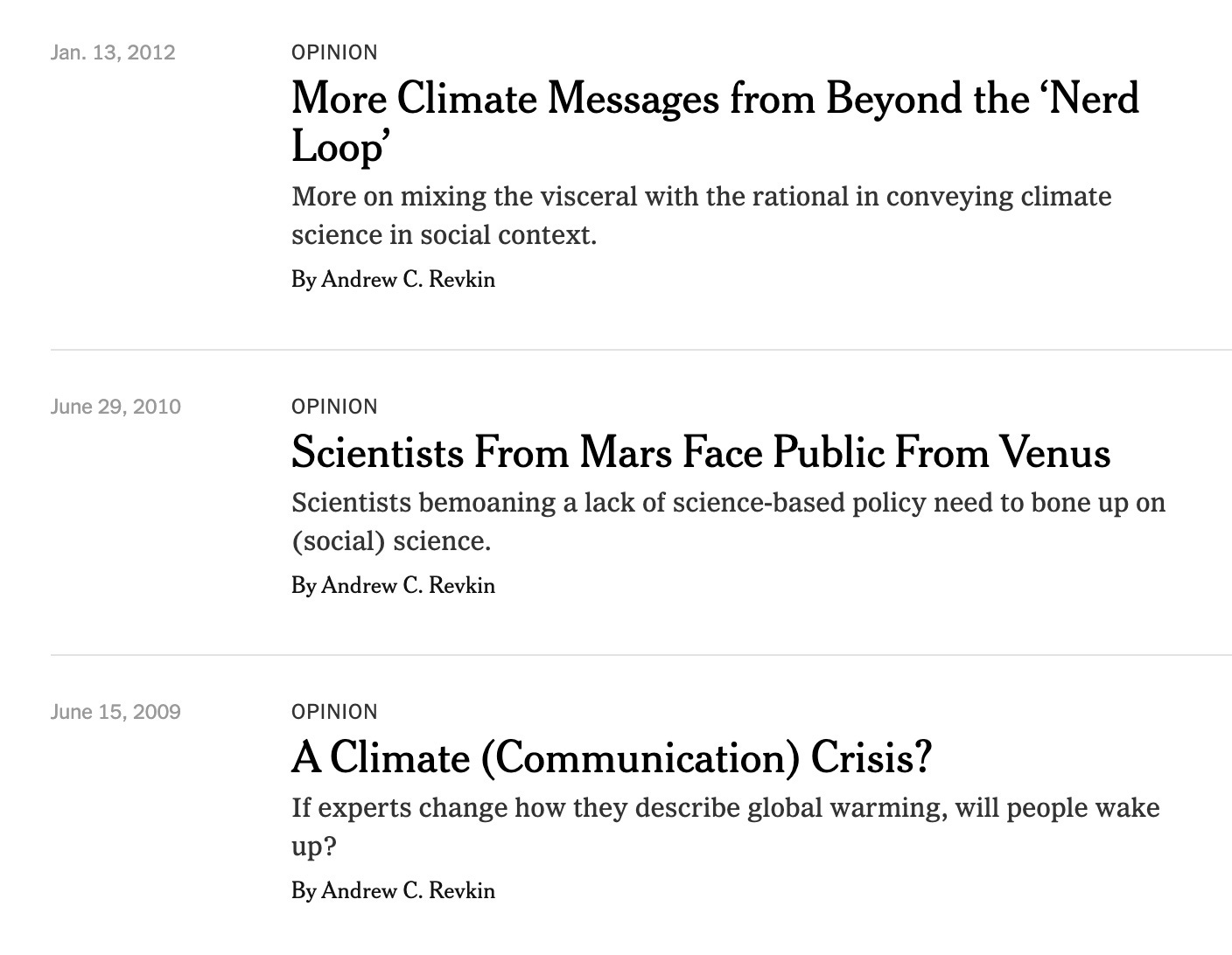The Climate Crisis - Simplified
Climate and clean-energy communication is filled with numbing jargon and complexity. But clarity is needed to connect and empower. A simple writing tool might help.
There are no magic bullets in climate and clean-energy communication, in part because there is no single problem or solution. As I’ve been saying, the “complexity monster“ is as much of an impediment to action as, say, fossil fuel companies.
But there are practices and tools that can help folks avoid pitfalls.
Here’s one fun example, along with some additional resources.
Thanks to a Twitter conversation sparked by my friend Randy Olson (@abtagenda, a “scientist-turned-filmmaker propagating ‘Narrative Culture’), I discovered the Up-Goer Five Text Editor.
This is an engaging writing platform and exercise that restricts the user to the “ten hundred” words most commonly used in English. (“Thousand” isn’t in that list, which is why the name and protocol are a bit stilted.)
Here’s the Up-Goer provocation you see when you visit the site:
CAN YOU EXPLAIN A HARD IDEA USING ONLY THE TEN HUNDRED MOST USED WORDS? IT'S NOT VERY EASY. TYPE IN THE BOX TO TRY IT OUT.
The platform was developed by Theo Sanderson, a young scientist at the Francis Crick Institute working in an arena full of jargon - the genetics of pathogens like SARS-CoV-2 and malaria parasites. Maybe it’s working in a field brimming with complexity that inspired his passion for concision. I’ll reach out to get Sanderson on a Sustain What webcast to find out.
The tool is evidently used in some classes, including one taught by Anthony Martin, a paleontologist/geologist in Georgia (@Ichnologist) who mentioned Up-Goer in a reply to Olson’s tweet (which was hailing CHATGPT-4’s narrative “intelligence”).


I broke away from my reporting on the latest jargon-filled report from the IPCC and tried out the tool as a way to describe human-driven climate change.
I immediately got a series of pop-up red alerts when I used words like pollution, energy, warming, fuel, atmosphere that aren’t in the list of ten hundred most common words.
Here’s what I came up with:
For many years, people have been adding stuff to the air that holds in the sun's power. This is making the world hotter. And that change is making it harder to grow food, have enough water and keep all people and other life safe. Most of the stuff added to the air comes from burning things that help us move around, work, build cities, stay warm or cool. We must find ways to live well without burning things. There's work for everyone to do to get this done!
But I realized that wasn’t very engaging.
So I paused and recalled Randy’s ABT framwork (short for “and, but, therefore”) that helps you hone the habit of building narrative pull into your writing, talks, films and the rest. The most basic point? Any time you see an “and” in a sentence, try substituting a “but” or “therefore.” I’ve been writing about, and promoting, Randy’s work since, gulp, 2009. You can explore my coverage at the bottom of the post.
Here’s my second try using the Up-Goer tool with Randy’s structural tips.
CAN YOU EXPLAIN CLIMATE CHANGE USING ONLY THE TEN HUNDRED MOST USED WORDS? IT'S NOT VERY EASY. TYPE IN THE BOX TO TRY IT OUT.
For hundreds of years, people have been burning stuff, making power that helps us move around, make things, build cities, stay warm or cool. But all that burning has added things to the air that hold in the sun's power, making the world hotter. That change is making it harder to grow food, have enough water and keep all people and other life safe. To continue to live well, we must find ways to get and use power without burning things. There's work for everyone to do to get this done!
Clearly there’s more work to be done here of course, but hopefully you agree this takes us in the direction of clarity for people who are not already tuned in. Randy predicts that CHATGPT-4 and successors may well help do even better. Read his post on this.
Insert, 3/29/23
Randy Olson emailed a cautionary note pointing to several old critiques of this platform, which I had missed even though Up-Goer Five has been around for a decade. In a way, I'm glad I was unaware of it all this time, but I'm still glad I gave it a try. I do think it's a valuable exercise, reminding those of us dug in on complex issues that cutting to the core is a vital starting point before building outward to capture the full scope of a challenge in words that resonate with wider audiences.
Here’s an excerpt from a useful 2016 blog post on Up-Goer Five by Stephen Heard, author of “The Scientist’s Guide to Writing”:
“Restricting one’s vocabulary to the most common thousand words implies that you think you’re talking to a child. And not a very bright one at that: the average six-year-old has an expressive vocabulary (words that they use) of around 2,600 words, and a receptive vocabulary (words that they understand) of over 10,000 (Owens 2011, Language Development). By talking down to our audience, we risk alienating them, and reinforcing the common preconception that scientists consider and hold themselves apart from non-scientists.”
Way back in 2013, the famed science writer Carl Zimmer wrote this criique of Up Goer Five on TwitLonger:
Here's the trouble with the Up Goer Five craze, in way more than 140 characters. Yes, it's funny to see how difficult it is to explain something even somewhat complex using only the most common thousand words (or ten hundred, since "thousand" doesn't make the cut). But it seems that a lot of scientists who are sincerely interested in communicating to non-scientists have become convinced that Up Goer Five Text Editor offers useful training in writing simply about complex topics. This seems to me to be completely bonkers. Of course, I can't say "bonkers" in the Up Goer universe, because it doesn't make the cut. But you know what I mean. And my children know what I mean. Why? Because an average six-year-old has a vocabulary, by some estimates, of 16,000 words. And an average adult's vocabulary is around 60,000. So Up Goer Five is only useful if you are going to talk to pre-schoolers. For an audience that's any older--even second grade--I can't see how it can help. And the time people spend using Up Goer Five is time they can't spending developing their skill with metaphors and the other tools of language that make it possible to convey the gist of complicated ideas. I even get the feeling from some commenters that they see their failure to describe physics or genetics with Up Goer Five as a validation of their feeling that it's hopeless to even try. And that's the worst effect any writing exercise could ever have.
-End insert
Tis the Gift to Be Simple
Please give Up-Goer a try on this or other sustainability challenges and post a comment with the results or links to your efforts!
Earth’s Publicist
I also encourage you to listen to my recent Sustain What conversation with David Fention, who for a half century build a career and public relations business around communicating progressive causes: “Explore the Shape-Shifting Media Climate with Earth’s Publicist.”
As is natural with publicists and journalists, I’ve had more than a disagreements with Fenton over the years. He and I also sharply differ on the role of nuclear energy in fostering climate progress. But he conveys a lot of valuable insights in our chat and in his book, The Activist’s Media Handbook.
Among them, if your top concern is climate justice, that’s great and appropriate, Fenton says. But don’t make that the core of your message (unless you’re talking to those already tuned in). As he told me, a host of surveys show nobody knows what climate justice is. Jobs arguments don’t hold much pull either. Listen to get his view on what can make a differrence.
Here’s one of my recent Sustain What chats with Randy:
Is science communication really worse than it was 100 years ago? Can simplicity help?
Click here for my Randy Olson coverage in The New York Times.









Thanks for the excellent Up-Goer Five example about climate change. I use that platform, too, in my graduate Translational Ecology course at Utah State. Your text flows a lot more smoothly than my description of a rare plant project, largely because "plant" is not one of the ten hundred words. I end up with "green things that grow in the ground."
Here's another simple approach. Strip out all the theory, and boil it down to a single real world action.
Urge your readers to all become vegetarians. That's a simple direct action each of us can take that makes a meaningful difference. If a reader declines to make this simple change, they aren't ready for your newsletter.
If nothing else, presenting this challenge will help your readers better understand their relationship with climate change.